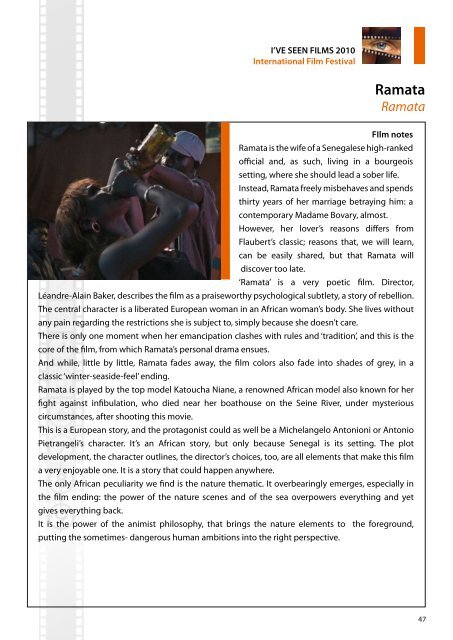- Page 1 and 2: I’ve Seen Films International Fil
- Page 3 and 4: I’VE SEEN FILMS 2010 Internationa
- Page 5 and 6: I’VE SEEN FILMS 2010 Internationa
- Page 7 and 8: I’VE SEEN FILMS 2010 Internationa
- Page 9 and 10: I’VE SEEN FILMS 2010 Internationa
- Page 11 and 12: I’VE SEEN FILMS 2010 Internationa
- Page 13 and 14: Bill Bristow (UK) producer, directo
- Page 15 and 16: I’VE SEEN FILMS 2010 Internationa
- Page 17 and 18: I’VE SEEN FILMS 2010 Internationa
- Page 19 and 20: I’VE SEEN FILMS 2010 Internationa
- Page 21 and 22: I’VE SEEN FILMS 2010 Internationa
- Page 23 and 24: I’VE SEEN FILMS 2010 Internationa
- Page 25 and 26: I’VE SEEN FILMS 2010 Internationa
- Page 27 and 28: I’VE SEEN FILMS 2010 Internationa
- Page 29 and 30: I’VE SEEN FILMS 2010 Internationa
- Page 31 and 32: I’VE SEEN FILMS 2010 Internationa
- Page 33 and 34: I’VE SEEN FILMS 2010 Internationa
- Page 35 and 36: I’VE SEEN FILMS 2010 Internationa
- Page 37 and 38: I’VE SEEN FILMS 2010 Internationa
- Page 39 and 40: I’VE SEEN FILMS 2010 Internationa
- Page 41 and 42: I’VE SEEN FILMS 2010 Internationa
- Page 43 and 44: I’VE SEEN FILMS 2010 Internationa
- Page 45: I’VE SEEN FILMS 2010 Internationa
- Page 49 and 50: I’VE SEEN FILMS 2010 Internationa
- Page 51 and 52: I’VE SEEN FILMS 2010 Internationa
- Page 53 and 54: I’VE SEEN FILMS 2010 Internationa
- Page 55 and 56: I’VE SEEN FILMS 2010 Internationa
- Page 57 and 58: I’VE SEEN FILMS 2010 Internationa
- Page 59 and 60: I’VE SEEN FILMS 2010 Internationa
- Page 61 and 62: I’VE SEEN FILMS 2010 Internationa
- Page 63 and 64: I’VE SEEN FILMS 2010 Internationa
- Page 65 and 66: I’VE SEEN FILMS 2010 Internationa
- Page 67 and 68: I’VE SEEN FILMS 2010 Internationa
- Page 69 and 70: I’VE SEEN FILMS 2010 Internationa
- Page 71 and 72: I’VE SEEN FILMS 2010 Internationa
- Page 73 and 74: I’VE SEEN FILMS 2010 Internationa
- Page 75 and 76: I’VE SEEN FILMS 2010 Internationa
- Page 77 and 78: I’VE SEEN FILMS 2010 Internationa
- Page 79 and 80: I’VE SEEN FILMS 2010 Internationa
- Page 81 and 82: I’VE SEEN FILMS 2010 Internationa
- Page 83 and 84: I’VE SEEN FILMS 2010 Internationa
- Page 85 and 86: I’VE SEEN FILMS 2010 Internationa
- Page 87 and 88: I’VE SEEN FILMS 2010 Internationa
- Page 89 and 90: I’VE SEEN FILMS 2010 Internationa
- Page 91 and 92: I’VE SEEN FILMS 2010 Internationa
- Page 93 and 94: I’VE SEEN FILMS 2010 Internationa
- Page 95 and 96: I’VE SEEN FILMS 2010 Internationa
- Page 97 and 98:
I’VE SEEN FILMS 2010 Internationa
- Page 99 and 100:
I’VE SEEN FILMS 2010 Internationa
- Page 101 and 102:
I’VE SEEN FILMS 2010 Internationa
- Page 103 and 104:
I’VE SEEN FILMS 2010 Internationa
- Page 105 and 106:
I’VE SEEN FILMS 2010 Internationa
- Page 107 and 108:
I’VE SEEN FILMS 2010 Internationa
- Page 109 and 110:
I’VE SEEN FILMS 2010 Internationa
- Page 111 and 112:
Filmography 2009 - Els anys del sil
- Page 113 and 114:
I’VE SEEN FILMS 2010 Internationa
- Page 115 and 116:
I’VE SEEN FILMS 2010 Internationa
- Page 117 and 118:
I’VE SEEN FILMS 2010 Internationa
- Page 119 and 120:
I’VE SEEN FILMS 2010 Internationa
- Page 121 and 122:
I’VE SEEN FILMS 2010 Internationa
- Page 123 and 124:
I’VE SEEN FILMS 2010 Internationa
- Page 125 and 126:
I’VE SEEN FILMS 2010 Internationa
- Page 127 and 128:
I’VE SEEN FILMS 2010 Internationa
- Page 129 and 130:
I’VE SEEN FILMS 2010 Internationa
- Page 131 and 132:
I’VE SEEN FILMS 2010 Internationa
- Page 133 and 134:
Filmography 2009 - Scopaesthesia,
- Page 135 and 136:
I’VE SEEN FILMS 2010 Internationa
- Page 137 and 138:
I’VE SEEN FILMS 2010 Internationa
- Page 139 and 140:
I’VE SEEN FILMS 2010 Internationa
- Page 141 and 142:
I’VE SEEN FILMS 2010 Internationa
- Page 143 and 144:
I’VE SEEN FILMS 2010 Internationa
- Page 145 and 146:
I’VE SEEN FILMS 2010 Internationa
- Page 147 and 148:
I’VE SEEN FILMS 2010 Internationa
- Page 149 and 150:
I’VE SEEN FILMS 2010 Internationa
- Page 151 and 152:
I’VE SEEN FILMS 2010 Internationa
- Page 153 and 154:
I’VE SEEN FILMS 2010 Internationa
- Page 155 and 156:
I’VE SEEN FILMS 2010 Internationa
- Page 157 and 158:
I’VE SEEN FILMS 2010 Internationa
- Page 159 and 160:
Filmography 2009 - La Mer 2008 - La
- Page 161 and 162:
Filmography 2010 - La note du père
- Page 163 and 164:
I’VE SEEN FILMS 2010 Internationa
- Page 165 and 166:
I’VE SEEN FILMS 2010 Internationa
- Page 167 and 168:
Filmography 2010 - The Old Lady Who
- Page 169 and 170:
Filmography 2009 - L’altra metà
- Page 171 and 172:
I’VE SEEN FILMS 2010 Internationa
- Page 173 and 174:
I’VE SEEN FILMS 2010 Internationa
- Page 175 and 176:
I’VE SEEN FILMS 2010 Internationa
- Page 177 and 178:
I’VE SEEN FILMS 2010 Internationa
- Page 179 and 180:
I’VE SEEN FILMS 2010 Internationa
- Page 181 and 182:
I’VE SEEN FILMS 2010 Internationa
- Page 183 and 184:
I’VE SEEN FILMS 2010 Internationa
- Page 185 and 186:
I’VE SEEN FILMS 2010 Internationa
- Page 187 and 188:
I’VE SEEN FILMS 2010 Internationa
- Page 189 and 190:
I’VE SEEN FILMS 2010 Internationa
- Page 191 and 192:
I’VE SEEN FILMS 2010 Internationa
- Page 193 and 194:
I’VE SEEN FILMS 2010 Internationa
- Page 195 and 196:
I’VE SEEN FILMS 2010 Internationa
- Page 197 and 198:
I’VE SEEN FILMS 2010 Internationa
- Page 199 and 200:
I’VE SEEN FILMS 2010 Internationa
- Page 201 and 202:
I’VE SEEN FILMS 2010 Internationa
- Page 203 and 204:
I’VE SEEN FILMS 2010 Internationa
- Page 205 and 206:
I’VE SEEN FILMS 2010 Internationa
- Page 207 and 208:
Filmography 2010 - Spiritual Walk 2
- Page 209 and 210:
I’VE SEEN FILMS 2010 Internationa
- Page 211 and 212:
I’VE SEEN FILMS 2010 Internationa
- Page 213 and 214:
I’VE SEEN FILMS 2010 Internationa
- Page 215 and 216:
I’VE SEEN FILMS 2010 Internationa
- Page 217 and 218:
Filmography 2010 - Schattenlinie (S
- Page 219 and 220:
I’VE SEEN FILMS 2010 Internationa
- Page 221 and 222:
I’VE SEEN FILMS 2010 Internationa
- Page 223 and 224:
I’VE SEEN FILMS 2010 Internationa
- Page 225 and 226:
I’VE SEEN FILMS 2010 Internationa
- Page 227 and 228:
Filmography 2009 - Passing Time 200
- Page 229 and 230:
I’VE SEEN FILMS 2010 Internationa
- Page 231 and 232:
I’VE SEEN FILMS 2010 Internationa
- Page 233 and 234:
I’VE SEEN FILMS 2010 Internationa
- Page 235 and 236:
I’VE SEEN FILMS 2010 Internationa
- Page 237 and 238:
I’VE SEEN FILMS 2010 Internationa
- Page 239 and 240:
I’VE SEEN FILMS 2010 Internationa
- Page 241 and 242:
I’VE SEEN FILMS 2010 Internationa
- Page 243 and 244:
I’VE SEEN FILMS 2010 Internationa
- Page 245 and 246:
I’VE SEEN FILMS 2010 Internationa
- Page 247 and 248:
I’VE SEEN FILMS 2010 Internationa
- Page 249 and 250:
Filmography 2009 - The Fall, Silent
- Page 251 and 252:
I’VE SEEN FILMS 2010 Internationa
- Page 253 and 254:
I’VE SEEN FILMS 2010 Internationa
- Page 255 and 256:
I’VE SEEN FILMS 2010 Internationa
- Page 257 and 258:
I’VE SEEN FILMS 2010 Internationa
- Page 259 and 260:
I’VE SEEN FILMS 2010 Internationa
- Page 261 and 262:
I’VE SEEN FILMS 2010 Internationa
- Page 263 and 264:
I’VE SEEN FILMS 2010 Internationa
- Page 265 and 266:
I’VE SEEN FILMS 2010 Internationa
- Page 267 and 268:
I’VE SEEN FILMS 2010 Internationa
- Page 269 and 270:
I’VE SEEN FILMS 2010 Internationa
- Page 271 and 272:
I’VE SEEN FILMS 2010 Internationa
- Page 273 and 274:
I’VE SEEN FILMS 2010 Internationa
- Page 275 and 276:
I’VE SEEN FILMS 2010 Internationa
- Page 277 and 278:
I’VE SEEN FILMS 2010 Internationa
- Page 279 and 280:
I’VE SEEN FILMS 2010 Internationa
- Page 281 and 282:
I’VE SEEN FILMS 2010 Internationa
- Page 283 and 284:
I’VE SEEN FILMS 2010 Internationa
- Page 285 and 286:
I’VE SEEN FILMS 2010 Internationa
- Page 287 and 288:
I’VE SEEN FILMS 2010 Internationa
- Page 289 and 290:
I’VE SEEN FILMS 2010 Internationa
- Page 291 and 292:
I’VE SEEN FILMS 2010 Internationa
- Page 293 and 294:
I’VE SEEN FILMS 2010 Internationa
- Page 295 and 296:
He lived in London from 1998 to 200
- Page 297 and 298:
Francesco Baccini was born in Genoa
- Page 299 and 300:
smart è un marchio Daimler >> smar
- Page 301 and 302:
The Rutger Hauer Starfish Associati
- Page 303 and 304:
Bill Bristow I’VE SEEN FILMS 2010
- Page 305 and 306:
I’VE SEEN FILMS 2010 Internationa
- Page 308 and 309:
L’attività dell’Assessorato al
- Page 311 and 312:
le emissioni. smart si conferma imb
- Page 314:
REGIA DI VALERIA GOLINO UNA PRODUZI
- Page 317 and 318:
TRUST YOUR GUT MAKE A MOVIE Rutger
- Page 320:
I’VE SEEN FILMS - International F



